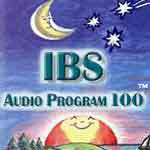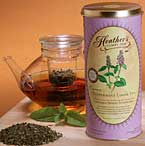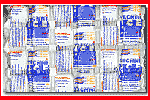| |
 |

Gut-directed hypnosis is one of the most effective ways to help relieve all IBS symptoms! Results can last more than 5 years.

In this Issue...
Food & Recipes
Rx News & Research
Ask Heather
About Us

Organic Acacia
Soluble Fiber
The prebiotic fiber that reduces bloating & gas!


Try Peppermint Caps
Peppermint Caps are the best for abdominal spasms, cramps and pain!

Get the IBS Diet Kit!
With Eating for IBS, plus organic fennel tea for bloating and gas, plus peppermint caps to prevent spasms and pain.
Take control of your IBS!

Get stable now ~
and stay that way!
Did you miss the latest
IBS newsletter and
Greek Roasted
Fish & Potatoes
recipe?
Past issues
are posted here!


Try Heather's
Peppermint Tummy Tea
Peppermint is a smooth muscle relaxant and has pain-killing properties. Our tea is large leaf with a high volatile oil content - much stronger than tea bags!
 Need help?
Need help?
Have questions?
Come
join the IBS Message Boards!


The IBS Starter Kit!
Learn every way possible to successfully manage your symptoms!
With the First Year: IBS, an essential guide, plus Eating for IBS, plus Acacia Tummy Fiber to start stabilizing immediately!

Heat Therapy for
IBS
Hot packs can help prevent stress-related attacks!
|
 |
|
| |

IF YOUR NEWSLETTER IS HARD TO READ OR IF THE LINKS DON'T WORK,
Please copy and paste this address into your browser window:
http://www.helpforibs.com/news/newsletter/pastcarb010804.html
January 8, 2004
This week ~ Yogurt and Irritable Bowel Syndrome constipation, pain, & diarrhea
 Twitter Twitter

Hello to everyone -
Our first newsletter of 2004 ushers in the New Year with lots of IBS news and a very special recipe! Roman Pasta Carbonara is a wonderfully safe version of a traditional Italian indulgence. Pasta Carbonara is a rich, creamy dish that is typically based on bacon or pancetta, whole eggs, whipping cream, and Parmesan cheese. Delicous, but deadly. Our IBS-friendly recipe is just as decadently rich and flavorful, but a few simple kitchen substitutions remove the fear factor. The pasta itself provides a good soluble fiber foundation, and allows the non-traditional addition of zucchini for heathy insoluble fiber and a lovely note of green color. If you haven't yet been convinced that soy and rice substitutes for meat and dairy can taste terrifically authentic, this is the mouth-watering recipe that will change your mind.
As always, we have the latest IBS and digestive health news, research, and studies as well, so enjoy!
Best Wishes,
Heather Van Vorous

Roman Pasta Carbonara
Makes 4-6 servings
3 T olive oil, divided
6 oz. soy bacon or fat free turkey bacon (try Fakin' Bacon or Smart Bacon brands)
1 C plain soy milk
1 garlic clove, minced
1/4 t crushed red pepper flakes (optional)
1 1/2 lbs. unpeeled zucchini, thinly sliced (about two medium)
1 lb. spaghetti or bucatini
6 organic egg whites
1 C soy or rice Parmesan cheese
Cook soy/turkey bacon in a medium non-stick skillet in 1 T olive oil until brown and crispy, stirring often. Remove bacon from skillet and set aside. Add soy milk, garlic, and crushed pepper to skillet and blend well, then remove pan from heat and set aside (you'll bring this skillet back to the heat later).
In a separate large non-stick skillet heat 2 T olive oil and add zucchini. Sautee until very tender and transparent, stirring often (about 10-15 minutes). Set aside zucchini with bacon.
Cook pasta in a large pot of boiling salted water until just tender but still firm to bite. Drain well, and return pasta to the pot. Set pot aside off of heat.
Add egg whites to a large bowl and whisk to blend. Bring reserved soy milk and garlic mixture in skillet to a boil, then gradually whisk the soy milk into the egg whites, whisking constantly. Whisk in Parmesan.
Add the milk/egg sauce to the pasta in pot and toss over medium heat until sauce thickens and coats pasta. Add bacon and zucchini and toss to heat through, add salt and pepper to taste.
For hundreds of delicious recipes, come visit the IBS Recipe Exchange Message Board!
Are you just learning how to eat for IBS? A little intimidated at the thought of special IBS recipes? Don't worry! Come see
the IBS Diet pages, and find the answers to all your questions.
 Irritable Bowel Syndrome's Possible Genetic Link
Irritable Bowel Syndrome's Possible Genetic Link
Researchers at Mayo Clinic studying irritable bowel syndrome say their study of people with this disorder suggests genetic factors may play a role. The study shows that the risk of having irritable bowel syndrome is nearly double in the families of people with the disorder.
"The next challenge is determining nature versus nurture," said G. Richard Locke, M.D., a Mayo Clinic gastroenterologist and one of the authors of the study. "Is this due to a gene or genes or is it due to a shared environmental factor? Our group is active in investigating these issues."
Check here for more
information...
Electric Activity of the Colon in Irritable Bowel Syndrome
The etiology of irritable bowel syndrome is unknown. It presents with crampy abdominal pain associated with alternating constipation and diarrhea but with no anatomic abnormality on diagnostic testing. Because the condition is related to motility disturbance, the hypothesis that a disorder of the colonic electromyographic activity is responsible for the colonic motile disorders in irritable bowel syndrome, was investigated.
The study concluded that irritable bowel syndrome exhibited a 'tachyarrhythmic' pattern of electromyographic activity with higher slow wave variables than normal and occasional AP. The resulting elevated basal colonic pressure and tone may explain some of the irritable bowel syndrome symptoms. Because diagnostic testing of the irritable bowel syndrome shows no anatomic abnormalities, it is suggested that the cause of irritable bowel syndrome is related to an abnormal focus in one or more of the colonic pacemakers emitting these abnormal waves.
Check here for more
information...
Bone Disease and Intestinal Problems May Share a Common Cause
Scientists have evidence that osteoporosis-like bone disorders and inflammatory intestinal disorders are both caused by abnormal regulation of a common protein. Dr. Simon R. Carding from the University of Leeds in England and colleagues report their study in the December issue of the journal Immunity. "Autoimmune associated bone disease and intestinal inflammation are closely linked with deregulation and hyperactivation of autoreactive CD4 T cells," they write. "How these T cells are activated and mediate disease is not clear."
Check here for more
information...
Visceral Perception Thresholds in Irritable Bowel Syndrome
Visceral hypersensitivity has been shown to be present in irritable bowel syndrome (IBS). The current study sought to compare the characteristics of visceral perception thresholds after rectal thermal and pressure stimuli between IBS patients and healthy subjects. Compared with healthy subjects, IBS patients demonstrated significantly initially lower perception thresholds and defecation thresholds to rectal thermal and pressure stimuli, particularly in patients with diarrhea-predominant IBS. Visceral hypersensitivity may be one of the important pathogenic mechanisms in IBS.
Check here for more
information...
Researchers Implicate Modern Refrigeration in Rise of Bowel Disease
Modern refrigeration is justifiably heralded as one of the most significant health advances of the 20th century, but French researchers say it may also be the cause of Crohn's disease. It is just a theory, but they say the evidence points to food refrigeration as the catalyst for a dramatic increase in Crohn's cases. It is known that genetic predisposition plays a role in Crohn's disease, and environmental factors such as smoking and diet have also been implicated. But while theories abound, no single cause has been identified.
Check here for more
information...
Lack of Sleep Can Lead to Weight Gain
"Sleep loss is associated with striking alterations in hormone levels that regulate the appetite and may be a contributing factor to obesity," says Michael Thorpy, MD, director of the Sleep-Wake Disorders Center at Montefiore Medical Center in New York. "Anyone making a commitment to lose weight should probably consider a parallel commitment to getting more sleep."
Check here for more
information...
Cinnamon Helps Type 2 Diabetes & Cholesterol
Cinnamon can improve glucose and cholesterol levels in the blood. For people with type 2 diabetes, and those fighting high cholesterol, this is important information. Researchers have long speculated that foods, especially spices, could help treat diabetes. In lab studies, cinnamon, cloves, bay leaves, and turmeric have all shown promise in enhancing insulin's action.
Check here for more
information...
Looking for the latest IBS research and news?
Check out the IBS Research Library!
 Common Pitfalls ~ The Seven Sneaky Deadly Sins of the IBS Diet
Common Pitfalls ~ The Seven Sneaky Deadly Sins of the IBS Diet
"I'm following the Eating for IBS diet, but I still have problems. What am I doing wrong?"
I hear from many people who have made a great effort to modify their diet for IBS, but who still have abdominal symptoms they feel certain are associated with their eating habits. They're often very frustrated because they believe that there aren't any steps left for them to take. The good news here is that it's much more likely than not that there are still dietary triggers involved, they're simply being overlooked.
I've found that there are seven specific pitfalls that ensnare many people as they adjust their diet - let's call them the Seven Sneaky Deadly Sins of the IBS Diet:
1. Coffee (yes, decaf counts)
2. Yogurt (it's the safest dairy product for IBS...isn't it?)
3. Alcohol (just one glass of wine is okay, right?)
4. Vitamin supplements (they're good for you, aren't they?)
5. No insoluble fiber foods (they're triggers, so you just don't eat them, right?)
6. Too low a dosage of soluble fiber supplements
7. Not drinking enough water (doesn't soda pop count?)
Second on the list is...
#2. I've eliminated most dairy from my diet, but I still have a daily cup of yogurt. I've heard that since yogurt is fermented, the lactose isn't a problem. I think the yogurt may be bothering my IBS, but this doesn't really make sense to me, so I'm still eating it. Should I stop?
Yes, you should stop eating yogurt, as well as all other dairy products that are still in your diet. All dairy is extremely likely to cause IBS symptoms to flare - from diarrhea and cramps to constipation, bloating, and gas. Dairy products, including yogurt and Lactaid milk, have casein, whey, and typically a very high amount of fat as well.
To make yogurt, the live organisms Lactobacillus bulgaricus and Streptococcus thermophilus are added to milk; the cultures turn the milk into yogurt by converting lactose (milk sugar) into lactic acid. Though this makes the lactose easier to digest, this is really only helpful for people who are lactose-intolerant; it's not necessarily of any use at all for people with IBS.
Most people with IBS are not lactose-intolerant, but they still have tremendous digestive problems from dairy. The milk proteins casein and whey (which are always in yogurt, as well as all other dairy products) are very difficult to digest. Trace amounts of these proteins, such as the casein used in some soy cheese products, are often (though not always) quite tolerable for IBS. The large amounts of casein and whey in dairy, on the other hand, are likely to trigger IBS symptoms.
Dairy products, including yogurt, are often very high in fat, particularly saturated fat. Saturated fats tend to be the most difficult for the body to digest, and saturated animal fats are the worst of all. All fats are GI tract stimulants and can trigger IBS attacks, so a low fat diet is crucial for keeping your digestion stable. This means that the fats you do eat should be heart-healthy and mono-unsaturated/poly-unsaturated. All high saturated fat foods should be avoided as much as possible. You'll easily obtain the small amounts of saturated fat your body needs from a low fat diet that incorporates natural plant sources such as olive oil, canola oil, nuts, and flax.
The live cultures in yogurt can be highly beneficial to IBS and digestive health in general. However, you don't have to eat dairy to get these benefits. You can choose soy yogurt that contains live cultures, you can take probiotic supplement capsules, and you can use a prebiotic soluble fiber supplement such as Acacia that will encourage the growth of good gut flora. Using probiotics and prebiotics for IBS is an excellent idea, and likely to help reduce and prevent a wide range of symptoms. Fortunately, there's no need to upset your gut by eating dairy in order to obtain these benefits!
Coming next...#3 on the list of the Seven Sneaky Deadly Sins of the IBS Diet!
 Heather & Company for IBS, LLC is dedicated to serving people with Irritable Bowel Syndrome. Our mission is to provide education, support, and products that allow people with IBS to successfully manage their symptoms through lifestyle modifications.
Heather & Company for IBS, LLC is dedicated to serving people with Irritable Bowel Syndrome. Our mission is to provide education, support, and products that allow people with IBS to successfully manage their symptoms through lifestyle modifications.
We offer extensive information and tangible help for IBS, including the world's best-selling and best-reviewed books for the disorder. We provide the internet's top IBS web site resources; a twice-monthly IBS Newsletter; seminars and classes; dietary brochures for patient distribution by health care professionals; an IBS Research Library; and Heather Cooks!, a healthy cooking show on Seattle television. Much of our work is based on Heather's development of the first and only comprehensive IBS dietary guidelines and recipes, an achievement which has earned numerous awards and accolades as well as thousands of thank you letters from IBS sufferers.
Heather & Company also provides the only patient-expert moderated IBS Message Boards on the internet with forums for diet, recipes, hypnotherapy, yoga, plus Crohn's and Colitis. In addition, we support and coordinate the formation and continuation of local in-person IBS support groups across the USA, Canada, the UK, Australia, and New Zealand. We will soon have other IBS services and products available.
Our website receives over 1.5 million visits each year, and our newsletter is sent to over 18,000 people. We are regular exhibitors at the Digestive Disease Week and American Dietetic Association conferences.
Sponsorship opportunities are available for the message boards and this newsletter for companies and/or products that have been legitimately established as helpful for digestive disorders.
Please contact us for information.

You are receiving this email because you have expressed interest in IBS news and information.
To unsubscribe from Heather's IBS Newsletter, click here http://www.helpforibs.com/news/unsub.asp or send an email to heather@helpforibs.com.
If you are viewing this newsletter on a website and would like to subscribe for email delivery, please "Join the IBS Newsletter" here.
ANTI-SPAM PRIVACY POLICY
LEGAL DISCLAIMER - This email is not intended to replace the services of a physician, nor does it constitute a doctor-patient relationship. Any application of the recommendations in this email is at the reader's discretion. Heather Van Vorous and Heather & Company for IBS, LLC are not liable for any direct or indirect claim, loss or damage resulting from use of this email and/or any web site(s) linked to/from it. Readers should consult their own physicians concerning the recommendations in this email.
Heather & Company for IBS, LLC
409 10th Avenue East Suite 202
Seattle, WA 98102 USA
© 2004 Heather & Company for IBS, LLC. All rights reserved.
|
|
|
|